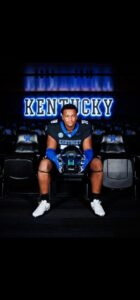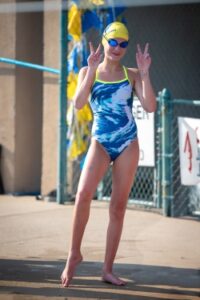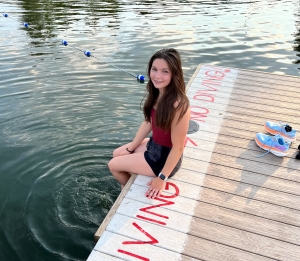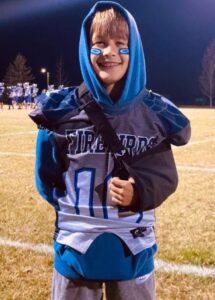Emilia Watkins

- patient name: Emilia Watkins
- patient age: 13
- condition: REDS (Relative Energy Deficiency in Sports)
- seen in: The Center for the Female Athlete
- providers: Lora Scott, MD, chief of sports medicine
Emilia Watkins was a busy, competitive swimmer, practicing multiple days a week with swim meets on the weekend. But during her 2022 swim season, everything came to an abrupt stop.
Emilia began losing an extreme amount of weight in a short period of time. She had low energy, was sick and not feeling well most of the time. This combination made it hard for her to recover from practice and swim meets. When she did compete, she was gaining time in her events, and at some meets her parents would tell the coach to pull her from the competition because they knew she couldn’t perform.
Eventually, Emilia’s winter swim coach, Kevin Menke, approached Emilia’s parents, Heather and Paul, to share that he no longer felt it was safe for Emilia to be in the water due to her deteriorating condition.
“Emilia was always coming into practice saying that she was tired and would then be unable to complete workouts. Not only was she physically exhausted, but she seemed like she was exhausted mentally, too,” said Kevin.
“during meet days, Emilia would seem drained throughout the whole session. She would get behind the blocks and seem unable to be ready to swim at a race level compared to the other kids in the same group as her. Even with appropriate rest, healthy eating and drinking habits, and changes in her training from the coaching side, her situation didn’t seem to change.”
Her summer swim coach, Jolene, had noticed a similar pattern the previous season saying, “Emilia had always been a strong swimmer, highly motivated and very competitive. However, I began to see a change in her ability to perform at both practices and meets. Emilia seemed weak and tired in the water. She would struggle to complete swim sets as effectively as previous seasons. Emilia’s body seemed to hold her back from achieving the level of performance of past seasons.”
Emilia met with her pediatrician to try to manage her weight loss and the other symptoms she was experiencing but wasn’t finding any treatment that worked. It seemed like Emilia was only feeling worse. It was then that Heather decided to reach out to the Center for the Female Athlete program at Dayton Children’s Hospital. The center cares for athletes of all ages and background to ensure that female athletes feel their best in all that they do. With a multidisciplinary team comprised of experts from sports medicine, nutrition and mental health, the team creates a personalized plan to fit each athlete’s goals and needs. Heather thought they might have the answers they were looking for.
getting answers
During Emilia’s first appointment with the Center for the Female Athlete she met with each team member to learn more about her experience, symptoms and establish a baseline for moving forward. It was during this appointment that Emilia responded to screening questions for REDS (relative energy deficiency in sports) formerly known as female athlete triad, a condition that happens when the body begins to break down from not getting enough energy (food) to support exercise. After doing the screening and learning more about Emilia’s symptoms, especially the fatigue, weight loss and change in sports performance, Lora Scott, MD, chief of sports medicine, came to the conclusion that Emilia was suffering from REDS.
The goal of treatment for REDS is to eat more and train less. That sounds simple, but it can take a team of professionals to get the balance right. Emilia was supported by different members of the Center for the Female Athlete team to help her manage her diagnosis including support from:
- Sports medicine: Dr. Scott was instrumental in explaining that athletes need rest, there isn’t always a need to train and that it’s okay to take three months off during off season just to let your body rest and have fun. Dr. Scott also recommended sports-specific return to training, which included physical therapy and strength training on dry land, to help increase her bone density.
- Mental health: Linh-Han Ikehara, MSW, LISW-S, behavioral health therapist, helped Emilia with recognizing that everything doesn’t have to be perfect and it’s okay if you don’t have a good swim or perform your best every time. She also worked with Emilia on better communication with her coaches, teammates and family. She would talk to Emilia about her life outside of her sport, including school and social relationships.
- Nutrition: Maria Brumfield, MS, RDN, LD, dietician, helped Emilia understand what she needed to eat to fuel her body, especially what type of food to eat to sustain her intense training schedule.
“We started to notice a difference just a few months after Emilia’s diagnosis,” said Heather. “Her energy got better, she slept better and in swimming she started seeing her performance improve with a lot more personal bests during swim meets. Emilia’s attitude changed, she was finally more engaged with her friends, family and teachers.”
what mattered to Emilia
With the support of the Center for the Female Athlete, Emilia is thriving. She dropped time throughout her winter swim season and for the first time ever, she made the top 20 at a swim championship in two different events. She even dropped 11 seconds in one event, which is a nearly impossible feat!
“Through Emilia’s time working with Dayton Children’s Center for the Female Athlete, I have noticed a huge difference,” said Coach Kevin. “Mentally, Emilia has been more attentive and lively at practices, not just being more involved in conversations with her coaches, but with her peers as well. She has also caught up in practice with many of her teammates, able to achieve goals in practice that seemed like a far reach from the days of her struggling as she was before. It has been great to see her smiling and to be feeling a great sense of happiness and accomplishment when she is swimming!”
“This year, coaches have seen a huge improvement in Emilia. She is able to work hard at practice and keep up with other top swimmers in her lane,” said Coach Jolene. “At meets, she is back to her competitive nature and winning races. This has not only had a positive effect on her swimming, but also on her disposition.”
To learn more about the Center for the Female Athlete, families can visit childrensdayton.org/center for the female athlete. Athletes can also schedule a free 30-minute consultation with one of the center’s athletic trainers to learn more about the program and see if they are a good fit.
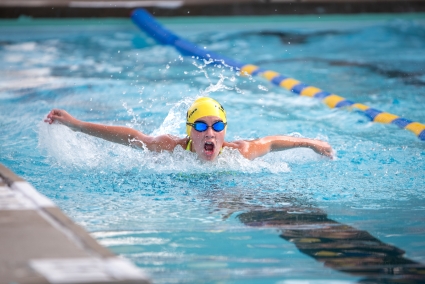
share your story
Every patient journey at Dayton Children’s is powerful — from NICU miracles to courageous cancer survivors and beyond. These patient stories not only celebrate our families but also offer hope and encouragement to others facing similar challenges. Share your experience today and help inspire, support, and celebrate the strength of our patients and families.
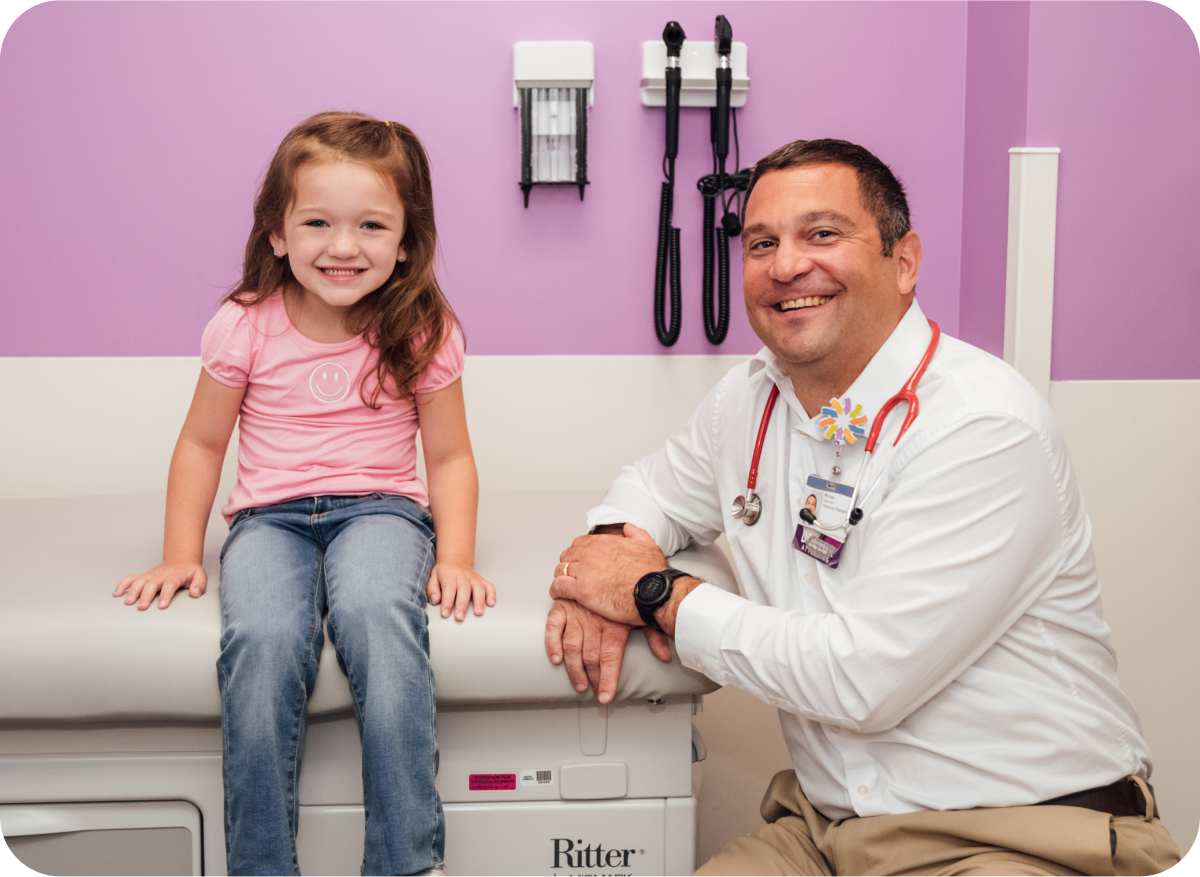
care that goes above and beyond
Because every child deserves care that goes above and beyond, Dayton Children’s provides compassionate, expert care for kids of all ages. Find a provider, schedule an appointment, or learn more about conditions we treat today.

